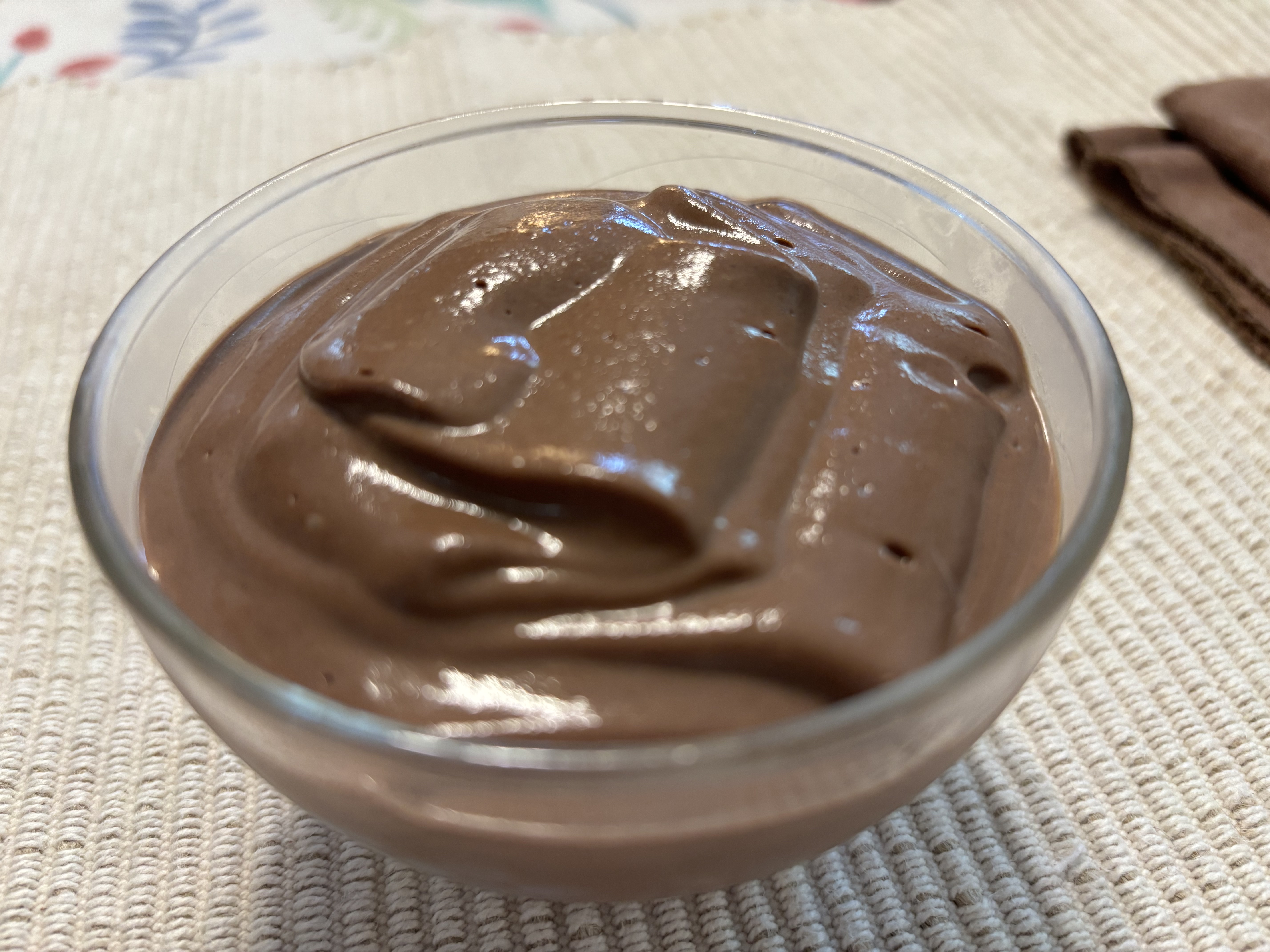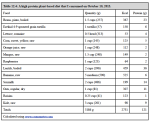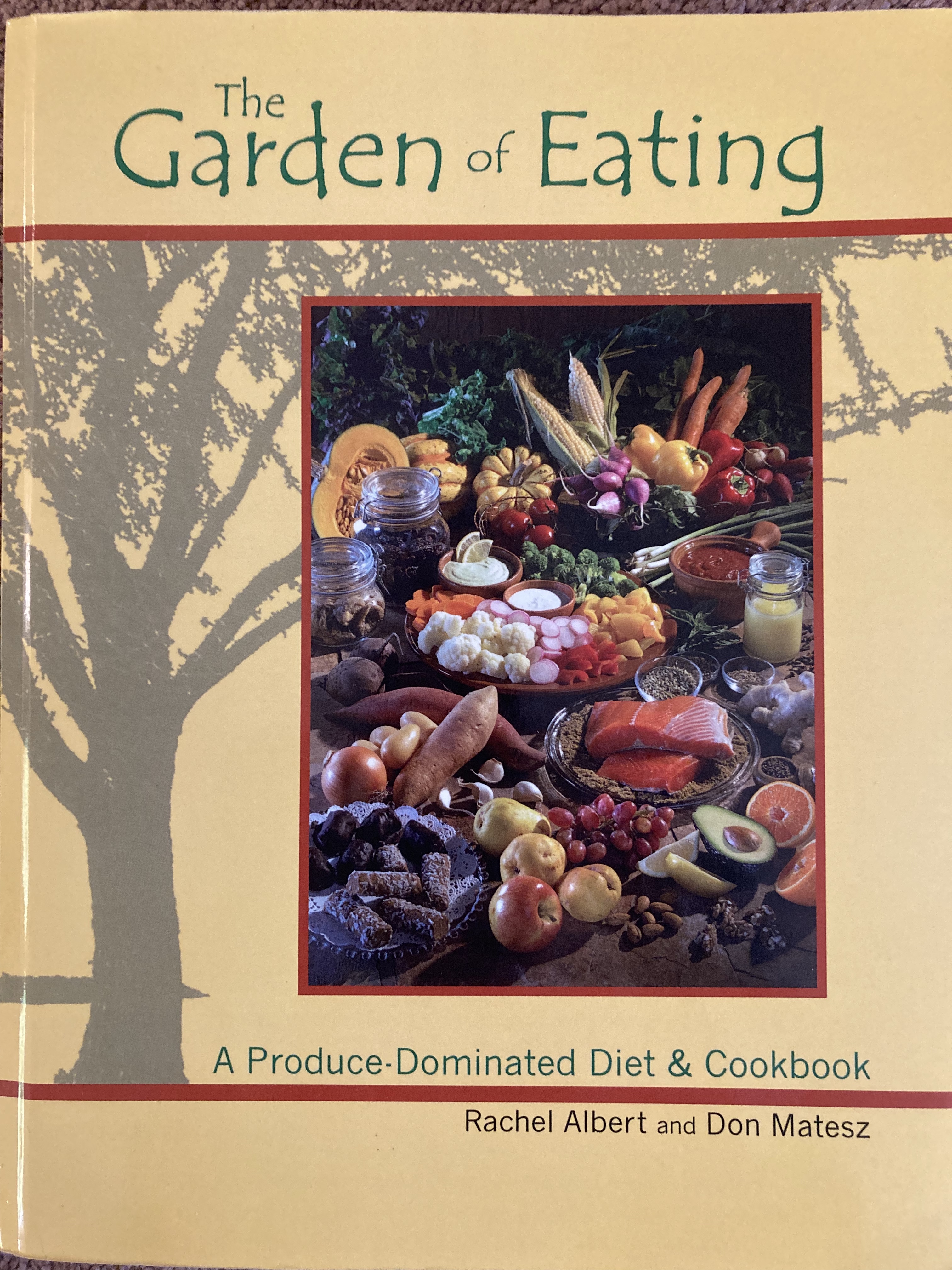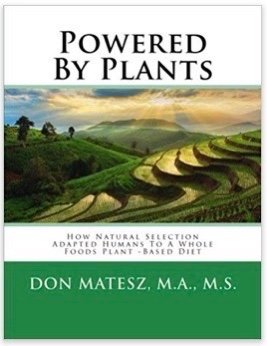Salt Promotes Atherosclerosis
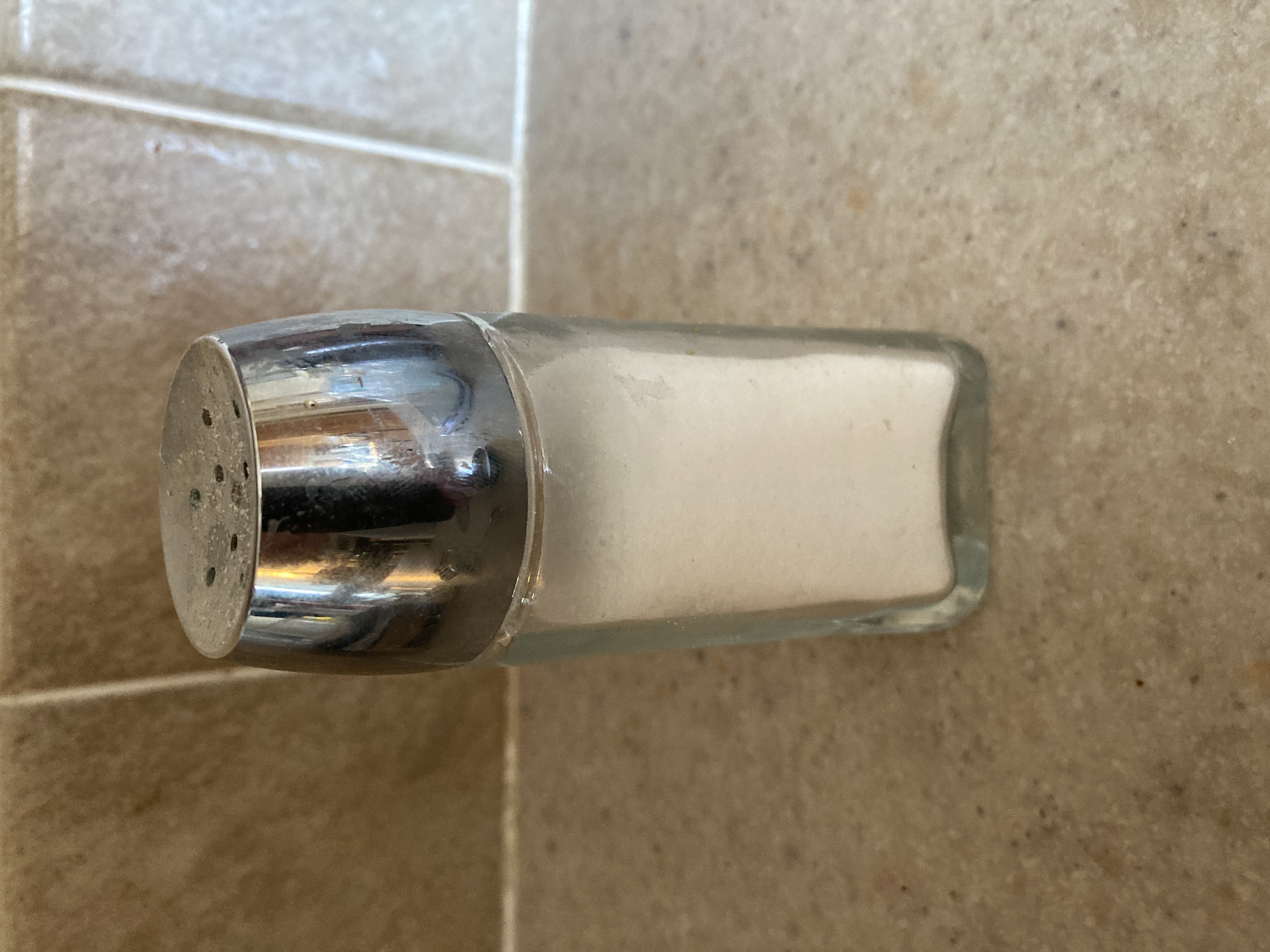
Salt promotes atherosclerosis –– you may not have heard this before, but accumulating evidence indicates that salt injures the lining of the blood vessels, setting the stage for atherosclerosis.
Many people are stuck in the binary con regarding diet and disease (as I have been). It seems the powers that be have succeeded again in dividing the people to fight amongst themselves in the diet-disease debate.
In one corner you have vegans and others advocating plant-based diets who believe that all diet-related diseases are caused by eating meat, milk and eggs (I've been there, done that). Some of the vegans have swallowed so much poison that they are ready to kill or imprison people who honestly disagree with this perspective.
In the other corner you have exclusive carnivores and others advocating low carbohydrate –– that is, low plant food –– diets. These people believe that all diseases including atherosclerosis are caused by sugar and other materials derived from plants (also been there, done that).
After having studied this problem for decades, I have come to believe that this debate like so many others is manufactured by the powers that be––"the establishment"––to keep people from understanding the truth so that they will continue to eat what really makes people sick, thereby keeping the "health care industry" and pharmaceutical profits rolling in. This debate also keeps the people warring among themselves so that they don't turn against the elites who keep feeding them lies.
A Chemist Explains How Salt Promotes Atherosclerosis
|
In Salt and the Seven Deadly Ills, chemist Karel Sporek asserts that salt is the primary cause of atherosclerosis. On chemical principles, Sporek outlines how both the sodium and the chloride in salt will contribute to atherosclerosis and osteoporosis: |
|
“It is well recognized that the modern diet provides too much sodium and not enough calcium. Among the consequences is osteoporosis and hardening of the veins. Osteoporosis is caused by the loss of calcium from bones; hardening of the veins is cause by deposition of calcium in the veins. Thus we have a tow sided attack of destruction on the body caused by one agent: salt. “The excess of sodium in the body fluids replaces calcium from bones by the mass action effect…thus causing a deficiency of calcium in the bones leading to softening and brittleness. “The excess of chloride in body fluids causes general irritation and inflammation in the circulatory system which is then ‘repaired’ by a protective coating of calcium and cholesterol. This isolates and protects from further direct damage, but also leads to hardening of the veins [sic] and restriction of the blood flow through the narrowed veins (arthritis). “Here we have a case where salt uses both of its components, sodium and chlorine, to do their separate destructive work in a co-operative way. In this instance sodium causes the removal of calcium from bones, and chlorine causes the deposition of the same calcium in the veins [sic].” |
Diet-Disease Debate Suggests Salt Promotes Atherosclerosis
Advocates of plant-based diets allege that meat, animal fat, and cholesterol cause atherosclerosis and cardiovascular disease. Advocates of low-carbohydrate diets allege that sugars and phytonutrients cause atherosclerosis and cardiovascular disease.
Both seek the cause for atherosclerosis among the macronutrients, based on epidemiological associations. The plant-based crowd points to the weak epidemiological association between meat-eating and cardiovascular disease. The animal-based crowd points to the prevalence of of cardiovascular disease among agriculturalists, including ancient Egyptians, and its absence among meat-eating hunter-gatherers.
The fact that either animal products or plant products may be linked epidemiologically with atherosclerosis and cardiovascular disease, except among selected pre-industrial hunter-gatherer (e.g. Blackfoot), pastoral (e.g. Masai) and horticultural (e.g. Kitava) populations suggests that the atherogenic factor is not one of the macronutrients, but some toxin added to both animal and plant foods in agricultural/civilized populations.
Those who seek for the cause among the non-toxic macronutrients overlook salt––as I once did. Among modern and ancient agricultural populations, meat-eaters consume plenty of salt. Meat, dairy and eggs are heavily seasoned and preserved with salt. Similarly, most people eating high carbohydrate diets also use plenty of salt, often even more than meat-eaters. Most people consider unsalted grains, rice, pasta, and potatoes bland and tasteless, so they “season” them with plenty of salt or have heavily salted foods (miso, tamari, soy sauce, sauces, pickles, etc) as condiments. Bread is one of the main sources of salt in the modern diet. Even candies and chocolates have salt added.
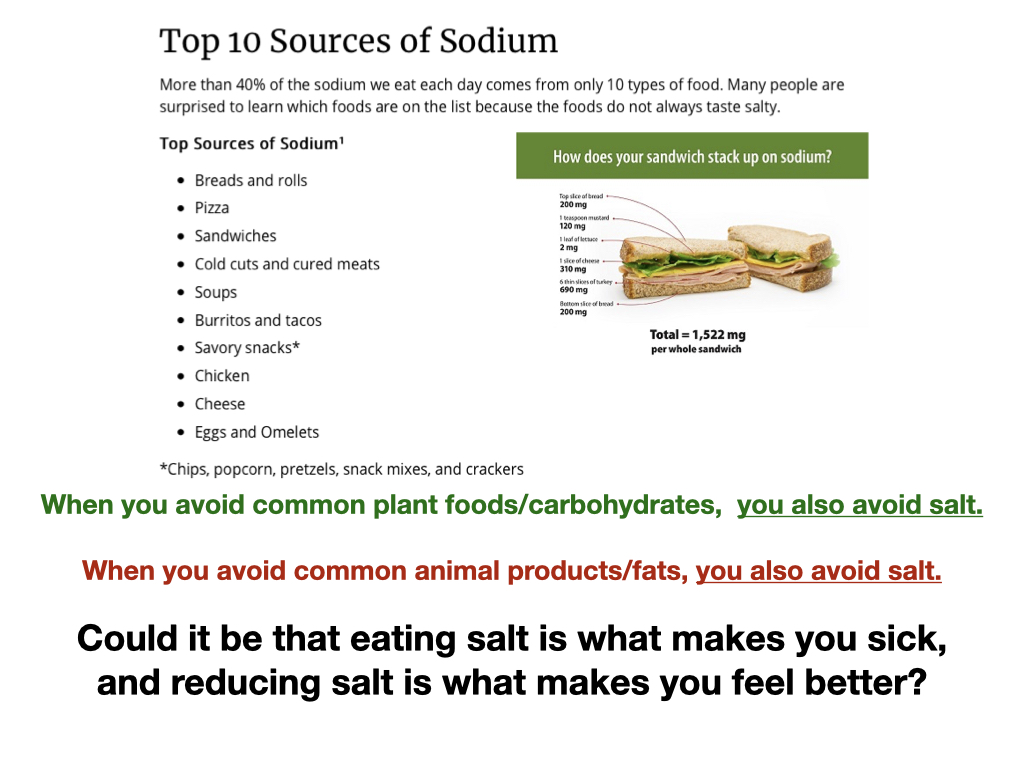
Crystalline salt is not an essential nutrient. We can obtain plenty of sodium and chloride from foods. Salt is not added to foods because we need the sodium chloride, but because salt kills bacteria and thus is a chemical preservative and flavoring. Yes, it is natural, but natural does not mean safe. Salt kills bacteria, it kills plants, it kills animals and now we have evidence salt promotes atherosclerosis to kill humans.
Sodium Portion of Salt Promotes Atherosclerosis
Accumulating evidence indicates that salt consumption is the primary driver of atherosclerosis.
A 2007 study reported that plasma sodium in the high normal range stiffens vascular endothelium and reduces nitric oxide release. This leads to hypertension and inability of the vascular system to dilate appropriately to stress. This would set the stage for an artery getting clogged by a clot during an emotionally stressful or physically demanding event. It also would produce generally impaired circulation (due to constriction of arterioles) and particularly difficulty with sexual arousal and performance (which rely on nitric oxide release and genital blood engorgement).
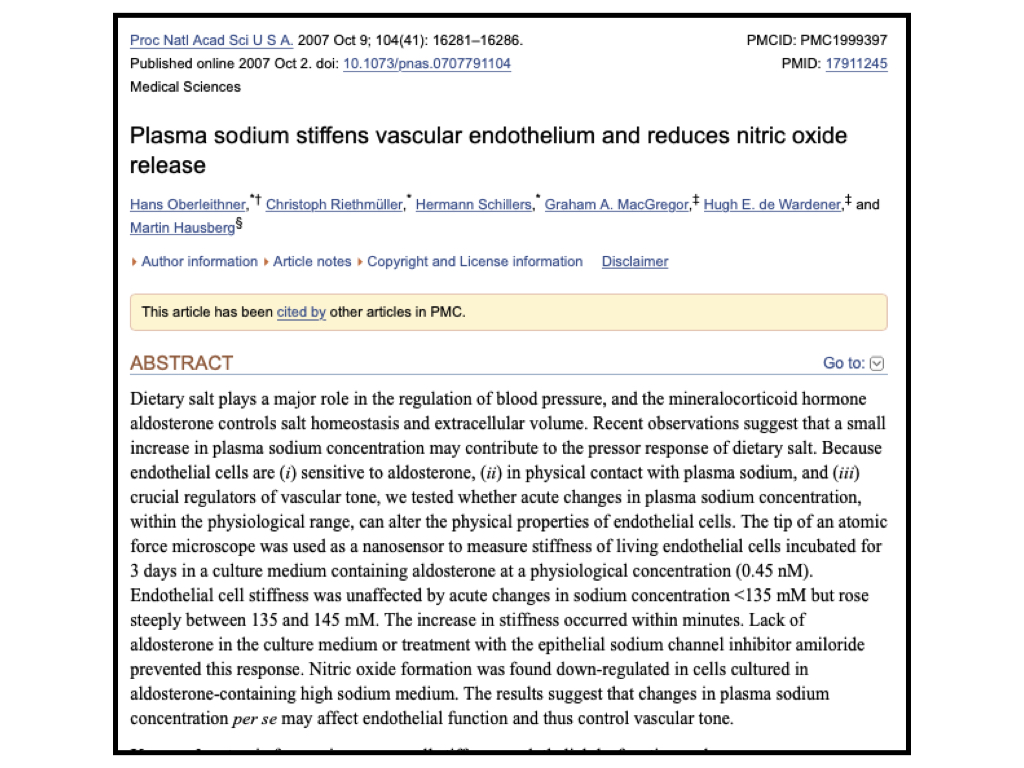
In contrast, a 2009 study found that in contrast to sodium, potassium softens the vascular endothelium and increases nitric oxide release. Thus elevating your potassium levels via high potassium foods and maintaining a high potassium:sodium ratio (at least 4-5:1) will keep your arteries softer and more responsive. Maintaining a high potassium:sodium ratio will likely prevent not only atherosclerosis and cardiovascular disease but also erectile dysfunction.
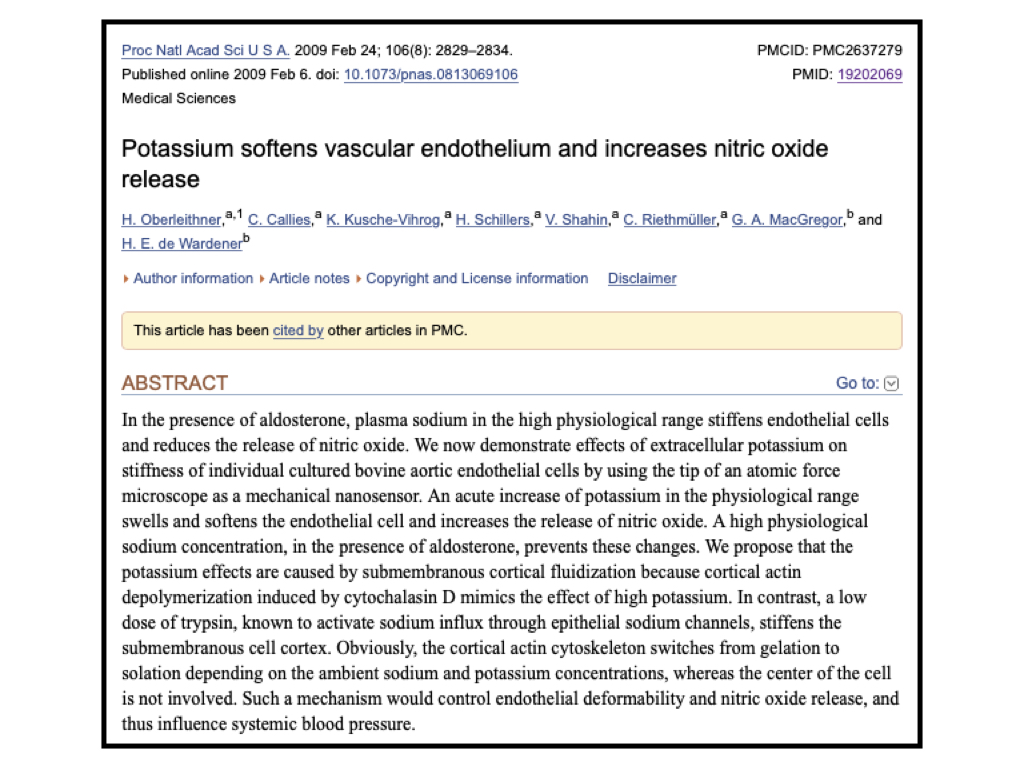
A 2014 study found that elevated sodium concentration stimulates endothelial production of the von Willebrand factor, a key initiator of the clotting cascade, leading to increased coagulation and thrombogenesis. If you combine this with coronary or cerebral arterial constriction, hardening and inflammation, you have a heart attack or stroke.
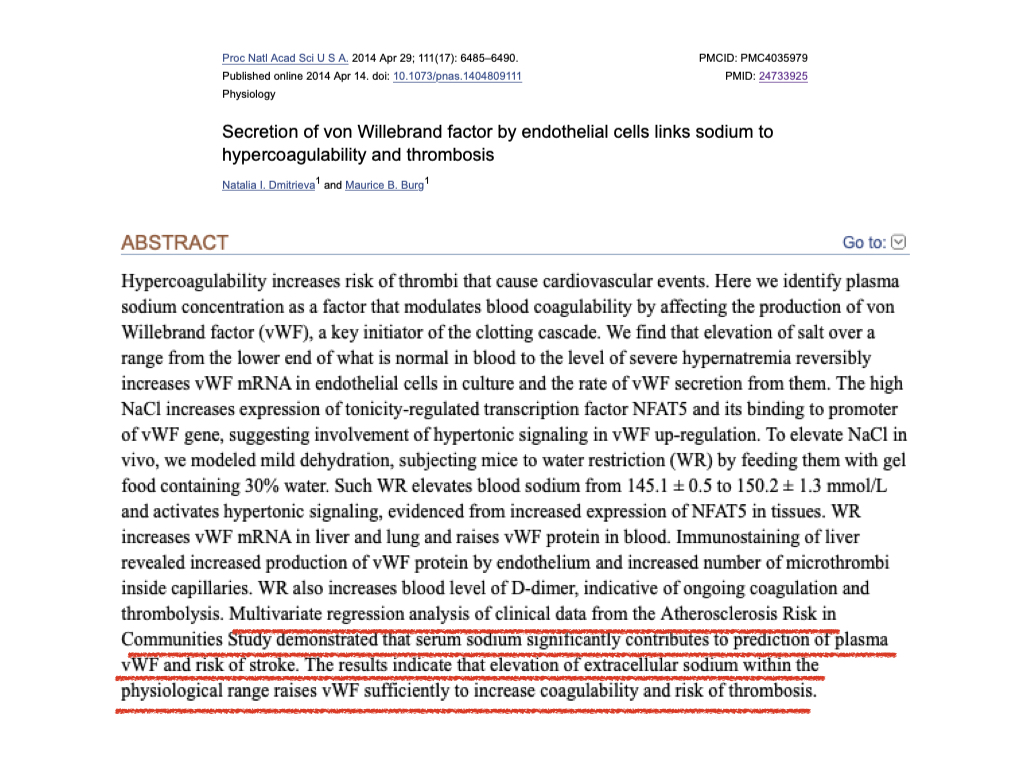
A 2015 study found that elevated extra cellular sodium (within the physiological range) and dehydration (which salt causes; salt is a dehydrating agent) increases endothelial stiffness and adhesion factors, and promotes inflammation and atherosclerosis. This team also analyzed data from the Atherosclerosis Risk in Communities Study (ARICS) and found that serum sodium is an independent predictor of 10 years risk of both coronary heart disease and stroke.
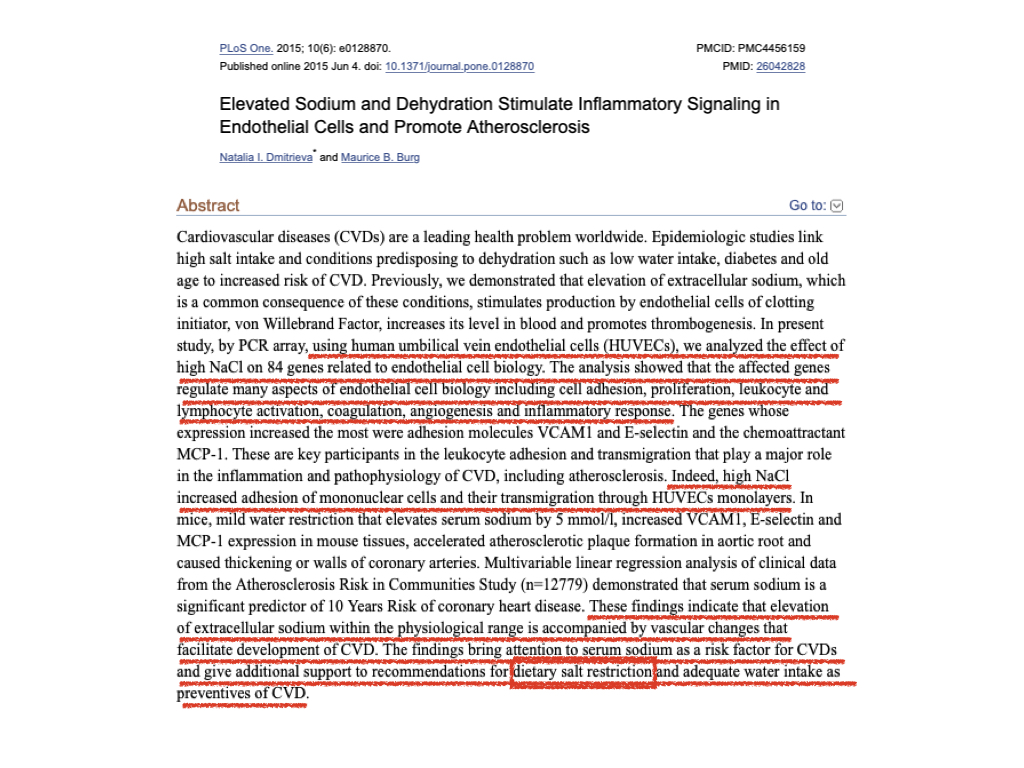
A 2021 study reported that, aside from younger age and a total cholesterol/HDL ratio <3.5 (i.e. high HDL), none of the traditional cardiovascular risk factors (such as low LDL) predicted/were associated with long-time absence of carotid artery atherosclerosis. Instead, serum calcium-phosphorus product, serum phosphate, and dietary sodium intake below 2300 mg/d were significantly associated with non-development of plaque. Of these mineral markers, low salt intake had the strongest association with long-term absence of plaque. The authors concluded that dietary and intrinsic minerals could be early contributors to arterial aging / atherosclerosis. In other words, this supports the idea that dietary salt promotes atherosclerosis (premature aging of arteries).
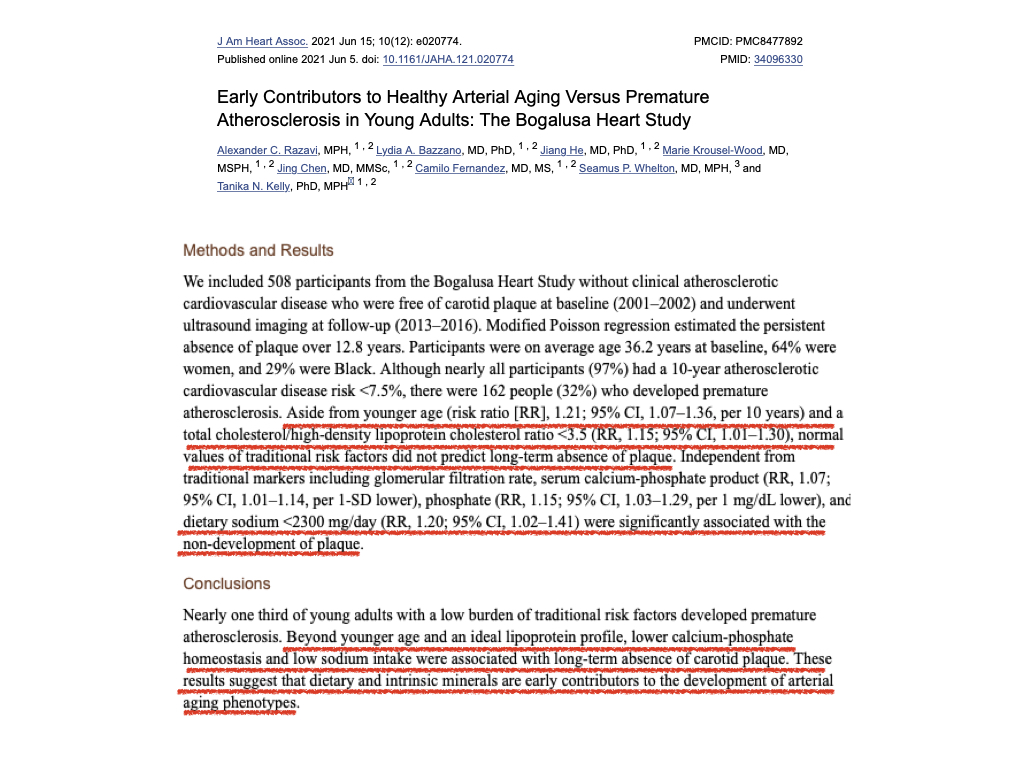
Chloride Portion of Salt Promotes Atherosclerosis
For some reason, the scientific community has acted as if sodium is the only active ingredient in salt and largely overlooked the fact that about 60% of salt consists of chloride. This in spite of considerable evidence that chloride is responsible for known adverse effects of salt. For example, non-halide salts of sodium, such as sodium citrate or bicarbonate, do not increase plasma volume, blood pressure, or urinary calcium loss.
A 2012 study used iron chloride to chemically injure artery walls and induce atherosclerosis. A 2013 study reports that treating the carotid arteries of mice with iron chloride causes oxidative damage and induces thrombosis.
The studies showing that iron chloride can injure artery walls and induce atherosclerosis and thrombosis provide evidence that salt promotes atherosclerosis and thrombosis by elevating chloride.
Iron chloride is the chloride salt of iron. Like sodium chloride, iron chloride is an ionic compound that is soluble in water. Living tissues are ~70% water. When ionic chloride salts are applied to living tissue, the chloride separates from the metal (sodium or iron) and forms hydrochloric acid.
The same is true when salt is added to living tissue. In water, salt forms both sodium hydroxide and hydrochloric acid, both very corrosive agents. This is why salt water burns the eyes, intensifies the pain of wounds, and corrodes concrete and metals.
All halogens, including chloride, are strong oxidizing agents. This is why chlorine is used to kill bacteria and bleach fabrics. The Merck veterinary manual states:
|
“Iodine and chlorine are among the oldest topical antimicrobial agents. They owe their activity to high affinity for protoplasm, where they are believed to oxidize proteins and interfere with vital metabolic reactions.” |
This oxidizing effect of chlorine and chloride is the reason we can use salt to kill bacteria and preserve foods.
A 2018 study found that chloride activates the NLRP3 inflammasome that is associated with atherosclerosis, Alzheimer’s disease, type II diabetes, arthritis and other modern diseases.
A 2019 study reported that numerous studies have found that elevated serum chloride produced by treating patients with “normal saline” (salt water) is associated with increased risk of acute kidney injury. Since chloride in the normal range produced by “normal saline” injures the kidneys, it very likely also injures the vascular tissues.
Hence, evidence supports the conclusion that the chloride portion of salt promotes atherosclerosis.
The Salt Solution
|
The accumulating evidence that salt promotes atherosclerosis is just the tip of the salt-disease connection. As discussed by Sporek in Salt and the Seven Deadly Ills and by Boynton, McCarty and Moore in The Salt Solution, we have good reason and evidence to believe that dietary salt also causes or promotes tooth decay, obesity, cancer, auto-immune diseases, non-insulin dependent diabetes, osteoporosis, kidney stones and kidney disease, among others. |
Recent Articles
-
High Protein Chocolate Tofu Pudding
Jul 01, 24 12:41 PM
A delicious high protein chocolate tofu pudding. -
Vegan Macrobiotic Diet For Psoriasis
Sep 05, 23 06:36 PM
Vegan macrobiotic diet for psoriasis. My progress healing psoriasis with a vegan macrobiotic diet. -
How Every Disease Develops
Aug 04, 23 06:22 PM
How every disease develops over time, according to macrobiotic medicine. -
Why Do People Quit Being Vegan?
Jun 28, 23 08:04 PM
Why do people quit being vegan? How peer pressure and ego conspire against vegans. -
Powered By Plants
Mar 16, 23 08:01 PM
Powered By Plants is a book in which I have presented a lot of scientific evidence that humans are designed by Nature for a whole foods plant-based diet. -
Carnism Versus Libertarianism
Dec 30, 22 01:55 PM
Carnism Versus Libertarianism is an e-book demonstrating that carnism is in principle incompatible with libertarianism, voluntaryism, and anarchism. -
The Most Dangerous Superstition Book Review
Nov 15, 22 08:46 PM
Review of the book The Most Dangerous Superstition by Larken Rose. -
Plant-Based Diet Is Best For Health Protection: Meta-Review
Oct 17, 22 11:22 AM
A plant-based diet is best for health promotion according to a meta-review of more than 300 reviews published 1950-2013.

